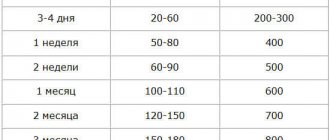Pediatricians say it's normal for babies under three months to show their displeasure by crying, especially after 6 p.m. However, all parents want their baby to have everything he needs and to cry as little as possible for one reason or another. The usual methods of calming are used: feeding, swaddling, rocking, rocking in a crib. If even after this the baby is dissatisfied with something, then perhaps he belongs to that fifth of all babies who suffer from colic. During them, the baby experiences discomfort in the tummy due to the accumulation of gases in it. How to calm a colicky baby? What is their reason? Read on!
Causes of abdominal pain in a newborn
Why does a newborn have a stomach ache? What should I do? The body has not yet adapted to digestion, so the first months of life cause many problems. There may be deviations in the behavior and condition of the baby. This can be vomiting, regurgitation, constipation, diarrhea, colic and much more.
Why your stomach may hurt:
- colic;
- constipation;
- immaturity of the digestive system;
- swallowed air while eating;
- the mixture is not suitable;
- increased gas formation due to the high fat content of mother's milk;
- inclusion of a new mixture in the diet;
- milk allergy;
- coli;
- weather change;
- if the baby feeds on mother’s milk, and she violated the diet and ate prohibited foods;
- problems with kidneys, lungs.
Experts say that the main reason for the baby’s poor condition is nutrition.
The main causes of colic in newborns
Colic is nothing more than intestinal spasms due to increased formation of gases.
A healthy and cheerful baby suddenly starts crying, and his tummy becomes bloated and hard. The baby begins to suffer from intestinal spasms, while the child screams and blushes, presses his legs to his tummy or arches. The processes of the occurrence of infantile colic are still not fully understood.
Medicine cites the following reasons as more likely sources of discomfort in newborns:
| Immaturity of the neuromuscular system responsible for the functioning of the gastrointestinal tract | At the moment of birth, the baby's ventricle is sterilely clean. With the mother's first milk, it is filled not only with nutrients, but also with beneficial microorganisms, which later form the intestinal microflora. At birth, the baby’s body is still protected by the mother’s hormones; over time, their effect weakens. If by this time the intestinal microflora is not yet sufficiently developed, the baby begins to suffer from colic. Since in the body of the crumbs there are not only useful, but also conditionally pathogenic microorganisms. The predominance of the latter leads to poor digestion of food (especially in children who are bottle-fed), which causes constipation or increased gas formation. |
| Insufficient enzyme production (lactase deficiency) | Both mother's milk and infant formula are digested by enzymes to break down milk. Colic occurs when the pancreas does not produce enough lactose, which is supposed to process the sugar found in milk. As the child grows, the need for milk increases, and the insufficiently productive work of enzymes cannot cope with the load on the baby’s stomach. |
| Incorrect attachment of the baby to the breast | Often during feeding, due to the baby’s incorrect position, he takes in air along with the milk, which causes regurgitation and colic. In addition, if the baby is weak or simply lazy, the breastfeeding time does not exceed 20 minutes. During this time, the baby does not have time to reach the most beneficial hind milk. Foremilk contains a large amount of carbohydrates, which serve as initiators of the fermentation process in the baby's body. |
| Malnutrition of a nursing mother | The cause of colic in a baby can be poor nutrition of the mother during lactation. Eating excess amounts of sweet or starchy foods (especially brown bread), as well as legumes, fresh vegetables and fruits, or natural cow's milk. In artificial infants, the source of colic can be an incorrectly selected formula. |
| Reaction to physical and psychological stimuli | Many parents do not even suspect that the cause of colic can be the baby’s increased sensitivity to physical or psychological discomfort. A wet diaper, cold, hunger or poor health or mood can also cause colic. |
How to tell if your newborn has a stomach ache
All newborns face this problem, so in China this period is called “100 days of crying.” How can a parent tell if their newborn is suffering from colic?
Child behavior:
- the baby is worried for no apparent reason;
- bends the legs, pulls them towards the tummy;
- behaves calmly all day, and cries in the evening;
- when his mother feeds him, he may cry;
- gas formation increases;
- problems with stool appear.
There are many reasons for abdominal pain in a newborn; the body has not yet adapted to food, so the baby is capricious from time to time.
When to see a doctor
How can you tell when abdominal pain in a baby may indicate serious problems?
When to call a doctor:
- the temperature has risen;
- strong cry of the child, lasts a long time;
- lethargy of the baby;
- vomit;
- upset stool, changes in color, smell;
- "acute belly"
People around you should know that if a child under 1 year of age has a temperature above 37.5°C, then a doctor is needed. Higher temperatures can have serious consequences. If you see above 38.5°C on the thermometer, you should call an ambulance. You can’t do without antipyretics.
If the baby screams loudly and for a long time, then you should invite a doctor. This behavior of a newborn indicates that something is bothering him. Your stomach may hurt and other health problems may appear. Only a doctor will determine what the matter is.
If the newborn suddenly becomes lethargic and refuses to suck milk or water, then you need to contact a doctor. Such symptoms may indicate infectious diseases that are dangerous for the baby.
If the baby spits up more than usual, or vomiting appears, these are reasons to seek help from a doctor. These symptoms are characteristic of a number of diseases, which include poisoning, food intolerance, intestinal infection and other problems.
Frequent loose stools in a baby are also a reason to consult a doctor. This symptom is dangerous for the child due to dehydration. The younger the child, the more dangerous the diarrhea.
You need to pay attention to the symptom of “acute abdomen”, which indicates the presence of health problems. The child develops cramping pain in the abdomen. The baby becomes restless, does not want to eat, may vomit, experience bloating, and problems with bowel movements. Sometimes these symptoms may be accompanied by bleeding from the anus. We need to call an ambulance.
Parents need to remember that they cannot give their newborn medications without choosing them themselves. You can easily make a mistake and harm the baby's health.
What to do if your newborn has stomach pain and constipation
Many babies have stomach pain because they are constipated. The child is in pain, he is suffering. How to understand that a newborn is constipated, what to do in this situation? First of all, you need to pay attention to the baby’s behavior.
Characteristic signs of constipation:
- hard stool;
- there is sleep disturbance;
- the appearance of droplets of blood in the stool;
- the child arches his back;
- is capricious;
- stomach is hard;
- pulls the legs towards the stomach;
- defecation occurs rarely, once a day or less;
- grunts, strains.
These signs indicate that the newborn is constipated.
If the baby is breastfed, the mother needs to pay attention to her diet. A woman should drink more fluids at this time.
It is recommended to eat dried apricots, beets, prunes and other foods that have laxative properties. The baby will receive the necessary elements along with the milk.
How to ease your baby's suffering:
- make light stroking movements with a warm hand on the tummy;
- bathe the baby, warm water soothes;
- give an enema;
- a warm diaper on the tummy alleviates suffering;
- use a candle for newborns.
We recommend watching a video about abdominal massage in newborns:
If the above methods do not help, you should consult a doctor. There is no need to choose medications for treating a newborn on your own.
How to calm a baby during colic - basic techniques
While parents are trying to calm a newborn with colic, it seems to moms and dads that nothing can please their baby. Don't despair, here are the main tactics that you should definitely try:
- Rocking. Place the baby in a cradle or crib with a transverse pendulum mechanism and rock it a little. It's also a good idea to turn on some "white noise" in the background. The sound of a vacuum cleaner or dryer may be suitable for this.
- Swaddle your baby. A large thin blanket or a special Velcro diaper may be suitable for this. The main thing is for your child to feel warm and comfortable.
- Give the baby a pacifier. Many babies are soothed by a pacifier, perhaps your child is no exception?
- Pat the baby's back. To do this, you need to carefully place your newborn on your lap with his tummy and gently stroke the baby's back. Perhaps this way it will be possible to relieve the child from excessive gas pressure in the intestines and, as a result, colic.
- Carry your newborn in your arms. Mom's warmth will help get rid of colic, and to prevent her back from getting tired, the little one can be placed in a sling.
- Place your baby in the carrier and take him for a walk. Steady movements as you walk can calm your newborn.
- Check your diet. If the baby is breastfed, then a possible reason for his discomfort with colic is the mother’s poor diet. Causes of colic include cabbage, onions, dairy products and coffee. To find out which product is the main “villain”, exclude all of the above, one at a time, for a couple of days, and you will know exactly what you should definitely not eat.
All of these techniques are likely to help calm a colicky baby. And when the baby turns 4 months old, the problem will most likely end on its own and the parents will be able to breathe easy for a while.
Pain after every feeding
If a child swallows too much air during feeding and his tummy begins to hurt, then a number of measures should be taken to help him.
Ways to help:
- You can help burp up excess air if you carry the baby vertically for 15 minutes after feeding;
- pay attention to how the child eats, he should wrap his lips well around the entire nipple, the nose should breathe well;
- if the baby is fed from a bottle, then hold it correctly, do not shake it too much;
- half an hour after eating you need to do several exercises, your legs need to be pressed to your stomach and then released.
If all of the above does not help, consult your pediatrician.
Stomach pain and diarrhea
Loose stool in a baby is normal because he eats liquid food. What is considered diarrhea in babies? What are the causes of this problem, and how can I help the child?
If a baby has bowel movements up to 10 times during the day, then this condition can be diagnosed as diarrhea. In addition, the stool may become mucous, greenish, and have an unpleasant odor. Sometimes droplets of blood appear.
Causes of diarrhea:
- violation of the diet by the mother who feeds him;
- allergy to the protein that is part of cow's milk if a woman drinks too much of it;
- rotavirus infection;
- milk intolerance;
- dysbacteriosis;
- binge eating;
- the mixture is not suitable;
- intestinal infection.
Parents must help the child and do it right. You need to call a doctor.
Helping a newborn with diarrhea:
- To prevent dehydration, give water every 15 minutes, 1 teaspoon is enough for the baby;
- Wash the baby after each bowel movement;
- ventilate the room;
- Do not give complementary foods, only breast milk.
To prevent various infections, it is necessary to maintain hygiene, and it is important for a nursing mother to adhere to a diet. There is an opinion that diarrhea appears in a child when his teeth grow. There is no scientific confirmation of this fact.
Medicines for newborns
It must be remembered that the diagnosis of a newborn must be made by a pediatrician.
| Name drug | Compound, active substance | dosage regimen | readings | contraindications |
| Espumisan L | simethicone; | 1 ml per day, in a bottle with food; |
|
|
| Infacol | simethicone; | 0.5 ml per 1 dose before eating; |
| individual intolerance; |
| Bobotik | simethicone; | 8 drops at a time, no more than 4 times a day, in a bottle of water or a mixture; |
|
|
| Sub simplex | simethicone; | 15 drops 2 times a day, in a bottle of water, mixture; |
|
|
The medications that are most often prescribed to newborns for abdominal pain are given. They should not be given to children without consulting a doctor.
Colic in a month old baby
The arrival of a newborn in a family brings not only joy, but also new worries. 70% of children in the first month of life experience intestinal colic, which makes infants cry in pain. Therefore, parents need to know how to relieve colic in a month-old baby.
- How do intestinal colic occur?
- Symptoms
- Time frame
- Why are intestinal colic dangerous?
- Causes of intestinal colic
- What to do to stop colic
- How to relieve pain
How do intestinal colic occur?
The gastrointestinal tract of a newborn baby is not yet fully formed.
The process of formation of the gastrointestinal tract and adaptation to a new diet is accompanied by increased gas formation. Gases accumulate in the intestines, stretching its walls, causing attacks of acute pain.
Acute pain caused by the accumulation of gases in the intestines is called intestinal colic. It is not a disease; colic can occur in healthy, normally developing babies.
This is a natural stage of child development. To go through it with minimal harm to the baby’s health, parents need to know the causes and prevention of colic development.
Symptoms
Intestinal colic in a one-month-old baby is determined by a set of severe symptoms. How to tell if your baby has colic:
- frequent sudden and prolonged crying, which fails to calm the child;
- hard, swollen belly;
- pressing the legs towards the stomach;
- periodic passage of gas, after which the child clearly feels relief;
- decreased appetite, the child may begin to lose weight.
An attack can begin at any time, day or night. Colic often begins shortly after feeding. They are more common in bottle-fed children, but breastfeeding does not relieve infants from attacks of pain.
The crying begins suddenly, then the child may calm down for a while and start crying again. This is due to the fact that pain occurs in waves.
Time frame
Each baby experiences colic differently. But for most children, the correct time frame is what pediatricians call the “rule of three”:
- attacks begin in the third week after birth;
- occur 2-3 times a day and last on average 3 hours;
- pass by the third month.
During this time, the newborn’s gastrointestinal tract adapts to the nutrition it receives, and the process of excess gas formation stops. But these are average data; in some children, painful attacks may continue for up to six months.
The duration and intensity of colic depend on several factors, including:
• Gestation period. In premature babies, gas may start later but last longer.
• Nutritional features: mother’s diet during breastfeeding, type of formula, frequency of feedings.
• Characteristics of the newborn. Temperamental babies have more intense colic.
Why are intestinal colic dangerous?
The fact that colic in a one-month-old baby is not a disease does not mean that it is safe.
In addition to the anxiety that a baby’s crying brings to its parents, other negative consequences are possible:
• Severe pain causes the newborn to cry loudly and for a long time. This may trigger the development of an umbilical hernia and the need for surgical intervention in the future.
• A state of prolonged painful discomfort weakens the baby's nervous system. Appetite and sleep are disturbed, tearfulness appears.
• Increased gas formation provokes malfunctions in the vulnerable gastrointestinal tract of the newborn. This may affect children's health in the future.
Therefore, when painful attacks develop, it is necessary to stop them in order to help the baby. Consulting a pediatrician for colic is necessary not only to adequately respond to the child’s condition.
Sometimes inexperienced parents mistake serious pathologies for colic that require immediate treatment. If the baby has a fever, vomiting or loose stools interspersed with blood or greens, the cause is not colic.
With these symptoms, medical attention is required immediately.
Causes of intestinal colic
Colic occurs when the newborn's gastrointestinal tract adapts to independent feeding. The baby's central nervous system, which controls the digestion process, is not fully formed.
The intestinal microflora is still developing. The intestines are just getting used to coping with milk. These factors provoke disruption of digestive processes and the formation of gases.
Useful tips for mothers: BABY HEALTH
The baby's stomach and intestines are still very small and easily become overfilled with milk. Gas bubbles further stretch the walls of the esophagus, causing pain.
Pediatricians also name other possible causes of excess gas formation:
- Unsuccessful diet and bad habits of a nursing mother.
- Incorrect feeding technique, when the baby, when sucking on the breast or bottle, takes in air along with the milk.
- Overfeeding.
- Incorrectly selected formula during artificial feeding.
What to do to stop colic
Correct behavior of the mother will help to significantly reduce the intensity of the attacks.
Proper nutrition and giving up bad habits
When breastfeeding, a woman is recommended to exclude from the menu foods that increase gas formation:
- vegetables: cabbage, legumes, fresh cucumbers;
- fruits: pears, grapes (raisins), dried apricots;
- milk with a high percentage of fat content;
- spicy seasonings;
- drinks with gas: kvass, sparkling water;
- baking from yeast dough;
- sweets.
The diet of a nursing mother with colic in a child excludes fresh vegetables and fruits; it is better to bake, stew or boil them. Herbal teas made from lemon balm, fennel, mint, and anise are useful drinks; fermented milk products are recommended.
Strong black tea and coffee should be excluded.
Smoking by a nursing mother causes nicotine to enter the milk and then into the child's body. Nicotine significantly worsens the functioning of the gastrointestinal tract. A woman must give up cigarettes and alcoholic beverages for the entire duration of breastfeeding.
Correct feeding technique
When breastfeeding, the baby should latch on not only to the nipple, but also to the surrounding area of the breast. Then it will not take in air along with the milk.
When feeding from a bottle, you need to hold it at an angle of 450 so that the milk completely fills its lower part. Nipples and bottles must be of high quality, suitable for feeding newborns.
Optimal diet
If a baby sucks a lot of milk in one feeding, the stomach may not be able to cope with such volume. If there is increased gas formation, it is advised to reduce milk portions and increase the number of feedings.
Before feeding, the baby is allowed to lie on his stomach on a hard surface - this will help the air leave the intestines.
In order for the baby to regurgitate excess milk and air trapped in the stomach, after feeding he needs to be held in a “column” for 5-6 minutes.
Formula that is easily digestible for babies
When artificial feeding, it is necessary to carefully select a breast milk substitute. If the newborn does not digest the formula well, gas formation increases.
Mixtures containing palm oil provoke gas formation, so if painful attacks occur, it is recommended to avoid them.
How to relieve pain
There are many ways to alleviate attacks of pain and help a baby. Medicines are used only when other methods do not help. What will help calm your baby:
• Mom's hugs. First of all, the mother needs to calm down herself and take the baby in her arms, calming and rocking him.
You can place his tummy on his mother’s stomach; the mother’s closeness and her warmth will help the baby relax.
• Warm. It relaxes the abdominal muscles. You can apply a flannel diaper folded in four, heated on a radiator or ironed, to the baby's belly.
To keep the heat longer, use a heated bag filled with flax seed. It retains heat for a long time.
• Massage. The child is placed on his back and the stomach is stroked in a circular motion clockwise, applying light pressure.
• Gymnastics. If there is increased gas formation, it is not recommended to swaddle the baby; its movement will help the gases leave the intestines. It is useful to bend the baby's legs, gently pressing them to the stomach.
You can put the baby on the fitball with his stomach and rock him slightly. But such exercises cannot be done if the stomach is very bloated.
• Baths. Warm water helps the baby relax. You can add herbal infusions to the water.
• Medicinal drinks. Dill water and herbal teas from fennel and chamomile are good for removing gases. Pharmacies sell ready-made tea in granules, for example, the company
• Gas outlet pipe. This is an effective remedy, but it must be used very carefully so as not to harm the child. Before use, you should consult your pediatrician.
If the pain is not relieved by these methods, you can use the drug recommended by your pediatrician. It can be:
• Probiotics: lacidophil, lactobacterin, plantex. They inhibit the growth of microorganisms that cause fermentation.
• Antispasmodics: espumisan, butterfly. They suppress muscle spasms, reducing the pain of attacks.
• Preparations containing simethicone. They destroy gas bubbles. They are allowed for infants at least three weeks old.
Colic is a natural process that most babies go through. Simple preventive measures will help, if not avoid, then significantly mitigate the pain of this period.
Proper care of the baby, diet by the nursing mother, high-quality bottles and pacifiers will help make it easier to get through this difficult period for the child and parents.
Under no circumstances should you give up breastfeeding; introducing formula will only worsen the situation. Parents need to be patient and take proper care of the baby.
- about the author
- Recent publications
Tatiana Fedorova
author of the publication (site editor)
KINDERGARTEN TEACHER has been working with the youngest people for many years.
Tatyana Fedorova recently published (see all)
- Malyutka formula: baby food - 08/31/2019
- Mixed feeding at 6 months - 08/12/2019
- Artificial feeding of a child at 4 months - 08/05/2019
How to help a newborn at home
A newborn has a stomach ache, what should parents do, how can they help at home without using medications? You can reduce your baby's suffering in simple ways.
Ways to relieve pain:
- do a small tummy massage, stroke the baby with warm hands in a clockwise circular motion;
- it will be easier for him to calm down in the arms of his family;
- fold the diaper several times, warm it up, and place it on the baby’s stomach;
- a nursing mother should drink dill water, herbal teas with chamomile, so that the baby gets the necessary substances with her milk;
- give an enema;
- Several exercises are useful: pull your legs towards your stomach, release them, and so on several times;
- use a gas outlet pipe.
These methods will help calm the child and reduce pain. If all else fails, you should call your pediatrician.
Why is it important to carry your baby in your arms during colic?
Dr. Dmitry Yanchuk in his Instagram blog spoke about an important condition for relieving colic.
“It’s no secret that bodily contact with the parents is of utmost importance in the adaptation of the newborn to normal life. Especially for newlywed children. Previously, the importance of doctors was underestimated, and people still did not care for them. Today, however, the popularization of this method obscures other important speeches, and there are no books and blogs, where choosing important points from thousands of pages of “water” is no longer easy.
If the child feels discomfort due to the excessive amount of gases, skin-to-skin contact or skin-to-skin contact may become urgent. The hands of fathers are truly a powerful tool, and a lot of problems can be solved if you handle them correctly. Colic is the biggest pain in the life of a little person and it is necessary to cope with it in such a way that it is easy for both the little one and the father.
And remember: the top of your hand, and only then your hands!
The tiger on a branch pose is one of the most suitable for reducing discomfort from colic.
An important detail - you must definitely replace your tired hands. A baby whose mother is tired of carrying him in her arms is unlikely to be able to help the baby as she should. The baby feels irritated and tired and becomes even more capricious.
Dr. Yanchuk recommends taking turns and wearing the baby in turns:
The father’s gentle hands flow into the child’s emotional state in a new way and often calm the child in just a few seconds.
Carry your baby in your arms, don’t be afraid to spoil him. This is basically impossible at this age. On the contrary, if now it’s enough to “apply” to the baby, then later it will be easier for him to let go of his parents and not be a little Velcro. May the baby be healthy!
Photo: depositphotos.com











